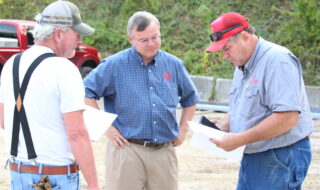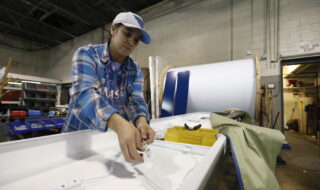April 28, 2025
New proposal would postpone Advanced Clean Trucks Rule by 5 years
On Thursday, April 24, the Vermont House Transportation Committee heard H.503 (Rep. Christopher Keyser, Rutland City), a proposal to delay implementation of the Advanced Clean Trucks (ACT) Rule – aka California Trucks.
In April, NFIB VT joined a coalition of business organizations calling for a postponement of the California Trucks Rule, which goes into effect next year.
Concerned about California Trucks? Click here: TAKE ACTION: Hit The Brakes on California Cars and Trucks! – NFIB
Proponents of the California Cars and Trucks Rules claim they’re needed to reduce greenhouse gas emissions (GHG) from the transportation sector. They also say the rules don’t force anyone to buy an electric car or truck.
But these claims don’t tell the whole story, and Vermonters should consider the following when evaluating the necessity and effectiveness of the California Cars and Trucks Rules:
Vermont’s Air Quality is Very Good: The Vermont Department of Health reports that the state’s air quality is good and the Vermont Department of Environmental Conservation says Vermont’s air quality is “among the best in the nation.” Ground-level ozone and particulate matter emissions declined substantially between 2000 and 2020 (most recent data posted by VDH).
Major improvements in vehicle engines and fuel quality since the 1960s have played a significant role in giving us cleaner air. Per U.S. EPA, vehicle emissions “are projected to be reduced by 80 percent by 2030 from 1990 levels.”
As noted in the coalition letter, newer diesel heavy trucks are much cleaner: “Since 1988, emissions of nitrogen oxides (NOₓ) and particulate matter (PM) have fallen by 99% due to advances in ultra-low sulfur diesel (ULSD), diesel particulate filters (DPFs), and selective catalytic reduction (SCR) systems. Fuel efficiency improvements have also reduced CO₂ emissions by more than 40% since 2010.”
Global Impact vs. Local Impact: Vermont is responsible for 8.56 million out of 53.8 gigatons, or just 0.016%, of global carbon dioxide equivalent emissions (CO2Eq). The impact of greenhouse gas emissions is globalized, not localized, and reducing Vermont’s GHG emissions will not have a measurable impact on global climate.
While the state should pursue cost-effective and practical steps, the cost of GHG reduction efforts need to be weighed against the economic impact to Vermont families and businesses.
LEV vs. ZEV: Vermont has long participated in California Cars Rules to reduce local and regional air pollution resulting from vehicle emission particulate matter. This is referred to as the Low Emission Vehicle (LEV) rules. Many states have adopted LEV rules as part of improving local air quality (although LEV also can increase the price of vehicles and impact availability).
ZEV stands for Zero Emission Vehicles and is aimed at expediting the adoption of electric vehicles regardless of their practicality for individual users or the state as a whole. ZEV requires that electric vehicles make up an increasing percentage of new vehicle sales over a ten-year period.
Fewer Passenger Car and Truck Options: ZEV will reduce the number of gas and diesel powered passenger car and truck options over the next ten years. In 2035, all new passenger car and truck sales in the state must be electric.
While ZEV does not mandate that you buy electric, it gradually eliminates all other options available in Vermont. Buyers can still go across the Connecticut River to purchase new gas or diesel passenger vehicles in New Hampshire, undermining the effectiveness of California Cars.
Current Electric Heavy Trucks Won’t Work for Vermont: California Trucks works essentially the same way, with the ZEV mandate for heavy duty trucks (class 2b to class 8) ratcheting up from 10% in 2035 to as high as 75% for some types of heavy trucks.
New heavy truck buyers will not be able to buy in New Hampshire and register in Vermont; they will need to either buy in Vermont or move their place of registration to a non-California Truck state.
California Cars and Trucks will increase the price of all vehicles in Vermont, limit options, and will cause other wide ranging economic harm. Dealers of light- and heavy-duty trucks will need to make expensive upgrades to their dealerships and change how they stock new inventory, costs that will be passed onto buyers of both types of vehicles.
Reality Is Hitting Other States: For heavy trucks, because dealers will have to sell an electric version before they can sell a gas or diesel version, non-electric options will dwindle and orders will grind to a halt. It’s difficult to sell electric versions of heavy trucks because they either don’t exist yet, are not practical, or can cost more than double the price of their diesel counterparts.
We’ve already seen this play out in Massachusetts, where new heavy truck registrations plummeted, and the state suspended the California Trucks Rule for two years.
You can watch the House Transportation Committee discussion here: VT House Transportation April 24, 2025.
TAKE ACTION: Hit The Brakes on California Cars and Trucks! – NFIB
NFIB is a member-driven organization advocating on behalf of small and independent businesses nationwide.
Related Articles














